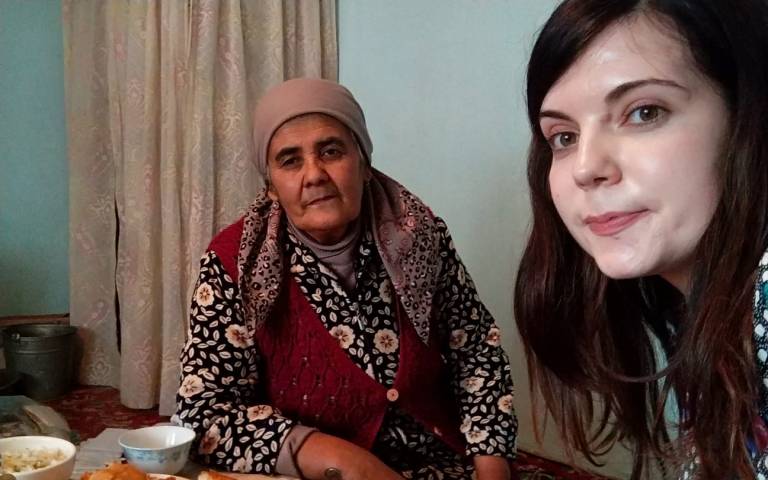UCL student’s human rights film to be broadcast globally
11 February 2021
A courageous UCL filmmaker’s graduate documentary is to be screened on the BBC after she overcame Covid challenges to highlight the plight of an imprisoned human rights journalist.

Marina Shupac’s film ‘Last Chance for Justice’ follows the story of Uzbek artist Khadicha Askarova as she tirelessly campaigns on behalf of her activist husband Azimjan, who was imprisoned for life in Kyrgyzstan for a crime he says he did not commit.
On her UCL mentor’s encouragement, Marina applied and was selected for One World Media’s Global Short Docs Forum which offered valuable intensive training on how to pitch to international broadcasters, including the BBC who snapped up her film.
The 23-minute film, partially shot in challenging circumstances during the pandemic, will be broadcast on 12-19 February as part of the BBC News 'Our World' series. It will also be available on BBC iPlayer for a year.
Marina, from Moldova, graduated from her UCL Master’s in Ethnographic and Documentary Film in 2020.
She said: “I come from an ethnic minority background in Moldova. When I visited Kyrgyzstan for the first time I was really struck by the situation of the Uzbek community there. I was wondering why there were so few stories about how they have lived since the inter-ethnic violence in 2010.
“I started to do more in-depth research to find out who my characters could be. Khadicha was one of the few people willing to talk about her experiences openly on camera.”
Azimjan was sentenced in September 2010 for his alleged role in the ethnic clashes between Kyrgyz and Uzbeks in the south of the country that June. More than 400 people were killed in the conflict - mostly Uzbeks - and a further 80,000 displaced.
Human rights organisations repeatedly campaigned for his release and the case attracted the attention of the UN High Commissioner for Human Rights, who concluded that Azimjan had been arbitrarily detained, held in inhumane conditions, tortured and not given a fair trial.
Marina said: “Azimjan was a prominent activist and journalist before his arrest. I thought there would be lots of stories about his case, but when I came back I realised there are no films about him at all. I was impressed by Khadicha’s heart, passion and courage to speak up. We became very good friends.
“Not having had previous experience I was kind of scared, thinking ‘Can I make this?’, but my tutor Lucy was very empowering and said it was a brilliant idea.”
Marina travelled to Kyrgyzstan twice to capture footage for the film over a month in total, in December 2019 and February 2020.
“It was quite challenging to film,” said Marina. “I had to take extra security measures for myself and I wanted to make sure not to put people at risk.”
She recounted how on one journey to Khadicha’s home in a village three hours away, the driver she had booked cancelled the trip at the last minute as he feared the authorities would think he was related to her.
“As a tourist you might not notice anything wrong,” Marina said. “But from the inside you can see that there’s still a feeling that the Uzbek community live in fear and don’t feel comfortable to talk about the conflict even now. In the end I took public transport to the village and thankfully it worked out.”
Marina returned to the UK in early March, just before the pandemic struck, and then had to work with her contacts in Kyrgyzstan to gather the remaining footage she needed to tell the story in the run-up to Azimjan’s high-profile appeal hearing at the country's Supreme Court.
“It was really challenging to follow the story during Covid. The Master’s programme taught us collaborative filmmaking so I was able to establish connections with the local community of Human Rights defenders and journalists. They helped me with access to archive material, and Khadicha filmed a lot for me on her mobile phone. I would do regular WhatsApp calls with her and guide her on which footage I needed.”
Azimjan received several awards while he was imprisoned: International Press Freedom Award of the Committee to Protect Journalists (2012) and Human Rights Defenders Award by the US State Department (2014).
Marina added: “For me this was a story not only of injustice, but also about the power of love and hope.”
She received funding to study at UCL through a Chevening Scholarship, the UK's international awards programme aimed at developing global leaders.
As part of the course students produce three short films, one of which is reportage. Marina decided to submit Last Chance for Justice as her graduation film.
Marina’s tutor and mentor, Lucy Sandys-Winsch (UCL Anthropology) said: “It is very rare for a student film to be bought for broadcast. This is even more of a remarkable achievement as some of the film was made under very difficult circumstances during the pandemic. We wish Marina every success with this terrific start to her career in documentaries.”
Last Chance for Justice will air between 12 and 19 February on BBC World News and BBC News Channel.
Links
- Programme schedule: BBC World News and BBC News Channel
- Ethnographic and Documentary Film (Practical) MA
- UCL Anthropology
- UCL Faculty of Social & Historical Sciences
- One World Media Global Short Docs Forum
- Chevening Scholarship
Image
- Marina Shupac and Khadicha Askarova take selfies after their first encounter in Bazar-Korgon town, Kyrgyzstan, in December 2019 (credit: Marina Shupac)
Media contact
Sophie Vinter
Tel: +44 (0)20 3108 7787
Email: s.vinter [at] ucl.ac.uk
 Close
Close

